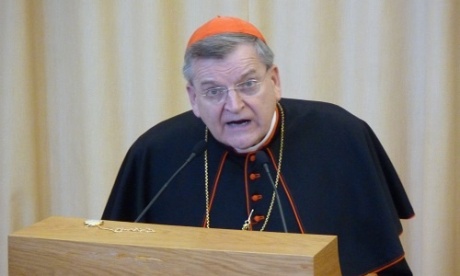An American cardinal has publicly criticised Pope Francis in a documentary to be screened on Irish television next week.
On “Pope Francis – The Sinner”, Cardinal Raymond Burke says that since Pope Francis’s election two years ago, “there really just is growing confusion about what the Church teaches”.
When Cardinal Burke’s term as prefect of the Apostolic Signatura came to an end, Pope Francis did not reappoint him.
Instead, Cardinal Burke was given a largely ceremonial role with the Order of Malta.
According to the Irish Times, the documentary will also feature former president of Ireland Mary McAleese saying that while she likes Pope Francis, she feels he just doesn’t get women.
“There’s a blind side here . . . that leaves good men . . . like Francis still carrying a residual element of misogyny that closes them off . . .,” she says.
The Pope’s Argentinean biographer Elisabetta Pique tells the programme “he was almost hated by some Jesuits . . .” there.
This is a view echoed by Fr Michael Petty who says “he provoked tremendous division” when he was (Jesuit) provincial in Argentina.
The former Superior General of the Dominicans Fr Timothy Radcliffe however believes that the Pope trusts in the Holy Spirit.
“A very important part of Pope Francis’ spirituality is daring not to be in control,” he said.
In an address earlier this month in England, Cardinal Burke said that last year’s synod on the family, called by Pope Francis, was “confused and erroneous” in that it sought to condone contraception, gay relationships and “living in a public state of adultery”.
Cardinal Burke said “confusion about the meaning of human sexuality” had led to breakdown of the family, corruption of children and “ultimately, self-destruction”.
During the address, which ran to 25 pages but did not mention Pope Francis, he criticised the report that was issued at the midpoint of the synod, which advocated using more welcoming language around homosexuality.
Cardinal Burke called this report “a manifesto, a kind of incitement to a new approach to fundamental issues of human sexuality in the Church”.
Sources
